
Films, TV, and Theatre

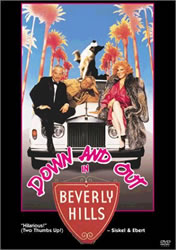 | |||
|
| | ||
Down
and Out in Beverly Hills (1986)
Satirical comedy starring Nick Nolte, Richard Dreyfuss and Bette Midler. A tramp foists himself on a neurotic, nouveau-riche Beverly Hills family. Stars: Nick Nolte, Bette Midler, Richard Dreyfuss, Little Richard Director: Paul Mazursky TV Guide
Variety
Staff Roger Ebert
It tells the story of a rich family that lives in the timeless comfort of a Beverly Hills mansion - in the kind of house where they use Architectural Digest for pornography. One day a bum wanders down the alley and into their backyard and tries to drown himself in their swimming pool. After he is saved, he changes their lives forever. In its broad outlines, this story is borrowed from Jean Renoir's classic film "Boudo Saved from Drowning." But this isn't just a remake. The director, Paul Mazursky, makes his whole film depend on the very close observation of his characters. Mazursky knows Beverly Hills (he lives there, on the quiet cloistered flatlands below Sunset Boulevard), and he knows the deceptions and compromises of upper-middle-class life (his credits include "An Unmarried Woman" and "Bob and Carol and Ted and Alice"). With great attention and affection, he shows us the lives that are disrupted by the arrival of the derelict - this seedy failure whose whole life is an affront to the consumer society. The film's heroes are the Whitemans, Dave and Barbara (Richard Dreyfuss and Bette Midler), and the bum, Jerry Baskin. He is played by Nick Nolte as the kind of guy who didn't set out in life to be a failure, but just sort of drifted from one plateau down to the next one, until finally he was spending most of his time talking to his dog. It is, indeed, the dog's disappearance that inspires Nolte's suicide attempt, and it will be the Whitemans' own amazing dog, named Matisse, that gets some of the loudest laughs in the movie. Maybe Mazursky is trying to tell us something about the quality of human relationships in Beverly Hills. The
Dreyfuss character is a coat-hanger manufacturer. He didn't set out in life to
be rich (one of his favorite The movie has a quiet, offhand way of introducing us to the rich man's milieu. We meet his wife, whose life involves long sessions with masseurs, yogis and shrinks (even her dog has a doggie psychiatrist). We meet his daughter (Tracy Nelson), a sunny-faced, milk-fed child of prosperity. We meet the Whiteman's neighbor, played by Little Richard with an incongruous mixture of anger and affluence (he complains that he doesn't get full service from the police; when he reports prowlers, they don't send helicopters and attack dogs). We meet Carmen (Elizabeth Pena), the maid, who greets her employer lustily in her servant's quarters but who grows, during the movie, from a soap opera addict into a political radical. We also meet the extended family and friends of the Whitemans, each one a perfectly written vignette, right down to the dog's analyst.
And, indeed, perhaps the last unreachable frontier of the very rich, the one last thing they cannot buy, is poverty. Dreyfuss spends a night down on the beach with Nolte and his bum friends, and there is a breathtaking moment at sundown when Nolte (who claims to be a failed actor) recites Shakespeare's lines beginning "What a piece of work is a man!" Certain predictable things happen. Nolte not only becomes Dreyfuss' good buddy, but is enlisted by all of the women in the household - the wife, the daughter and the maid - as a sex therapist. Dreyfuss will put up with almost anything, because he really likes this guy, and Nolte's best hold on them is the threat to leave. Mazursky makes the most of that paradox, and gradually we see the buried theme of the movie emerging, and it is the power of friendship. What these people all really lacked, rich and poor, sane and crazy alike, was the power to really like other people. The movie should get some kind of award for its casting. Dreyfuss, who has been so good in the past as a hyperactive overachiever, succeeds here in slightly deflecting that energy. He has the success, but is bedazzled by it, as if not quite trusting why great wealth should come to him for doing so little. He channels his energy, not into work, but into enthusiasms - and Nolte becomes his greatest enthusiasm. For Bette Midler, Barbara Whiteman is the perfect character, all filled with the distractions of living up to her level of consumption. Nolte in some ways has the subtlest role to play, although when we first see it, it seems the broadest. His shiftless drifter has to metamorphize into a man who understands his hosts so deeply that he can play them like a piano. The supporting roles are so well filled, one after another, that we almost feel we recognize the characters before they're introduced. And Mike, the dog, should get an honorary walk-on at the Oscars. Perhaps I have made the movie sound too serious. Mazursky has a way of making comedies that are more intelligent and relevant than most of the serious films around; his last credit, for example, was the challenging "Moscow on the Hudson." So let me just say that "Down and Out in Beverly Hills" made me laugh longer and louder than any film I've seen in a long time. Sky Movies A
modishly alternative comedy based on but with none of the class of the 1932 French
classic Boudu Sauvé
| |||
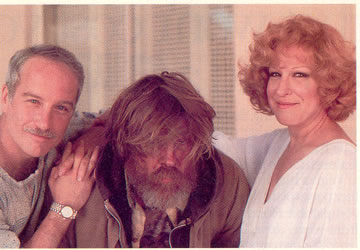 This
very first R-rated picture ever to come out of that bastion of squeaky-cleanness,
Walt Disney Studios (under the aegis of their subsidiary Touchstone), is a howl
from start to finish. Dave Whiteman (Dreyfuss) has made it big in the coat hanger
business. He and wife Barbara (Midler) live in a huge house in Beverly Hills with
their children, Jenny (Nelson), an anorexic college student, and Max (Richards),
an androgynous budding filmmaker. Barbara is the ultimate yenta who spends her
days having her hair and nails done, shopping, and going to classes. Also living
in the house are Carmen (Pena), a seductive Latino maid with whom Dave is having
an affair, and Matisse (Mike), the family dog who refuses to eat despite regular
visits to a doggie psychiatrist. When tramp Jerry Baskin (Nolte) enters their
lives after attempting to drown himself in the Whiteman swimming pool, Dave saves
his life and invites him to become part of the family, a decision that has some
very comic results.
This
very first R-rated picture ever to come out of that bastion of squeaky-cleanness,
Walt Disney Studios (under the aegis of their subsidiary Touchstone), is a howl
from start to finish. Dave Whiteman (Dreyfuss) has made it big in the coat hanger
business. He and wife Barbara (Midler) live in a huge house in Beverly Hills with
their children, Jenny (Nelson), an anorexic college student, and Max (Richards),
an androgynous budding filmmaker. Barbara is the ultimate yenta who spends her
days having her hair and nails done, shopping, and going to classes. Also living
in the house are Carmen (Pena), a seductive Latino maid with whom Dave is having
an affair, and Matisse (Mike), the family dog who refuses to eat despite regular
visits to a doggie psychiatrist. When tramp Jerry Baskin (Nolte) enters their
lives after attempting to drown himself in the Whiteman swimming pool, Dave saves
his life and invites him to become part of the family, a decision that has some
very comic results.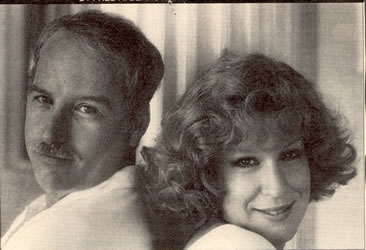 institutions, especially marriage. It's a loving caricature of the nouveau riche
(Beverly Hills variety) and although it is more of a comedy of manners than a
well-developed story, there are enough yocks and bright moments to make it a thoroughly
enjoyable outing.
institutions, especially marriage. It's a loving caricature of the nouveau riche
(Beverly Hills variety) and although it is more of a comedy of manners than a
well-developed story, there are enough yocks and bright moments to make it a thoroughly
enjoyable outing. 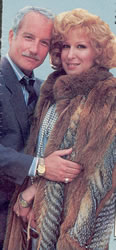 Buddy
Hackett once said that the problem with Beverly Hills is, you go to sleep beside
your pool one day and when you wake up you're 75 years old. "Down and Out
in Beverly Hills" understands that statement inside-out.
Buddy
Hackett once said that the problem with Beverly Hills is, you go to sleep beside
your pool one day and when you wake up you're 75 years old. "Down and Out
in Beverly Hills" understands that statement inside-out. 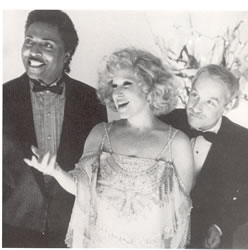 conversational gambits involves his own good luck and assurances that it could
have happened to you as easily as to him - nice if you are him, but not if you
are you). Here he is, living in a manicured mansion, exploiting wetback labor,
sleeping with the Mexican maid, driving a Rolls convertible, selling 900 million
coat hangers to the Chinese, and yet, somehow, something is missing. And almost
from the first moment he sets eyes on the Nolte character, he realizes what it
is: the authenticity of poverty.
conversational gambits involves his own good luck and assurances that it could
have happened to you as easily as to him - nice if you are him, but not if you
are you). Here he is, living in a manicured mansion, exploiting wetback labor,
sleeping with the Mexican maid, driving a Rolls convertible, selling 900 million
coat hangers to the Chinese, and yet, somehow, something is missing. And almost
from the first moment he sets eyes on the Nolte character, he realizes what it
is: the authenticity of poverty. 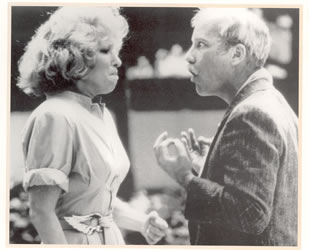 "Down
and Out in Beverly Hills" revolves around the fascination that Dreyfuss feels
for Nolte's life of dissipation and idleness. He is drawn to the shiftless sloth
like a moth to a flame. A bum's life seems to have more authenticity than his
own pampered existence.
"Down
and Out in Beverly Hills" revolves around the fascination that Dreyfuss feels
for Nolte's life of dissipation and idleness. He is drawn to the shiftless sloth
like a moth to a flame. A bum's life seems to have more authenticity than his
own pampered existence. 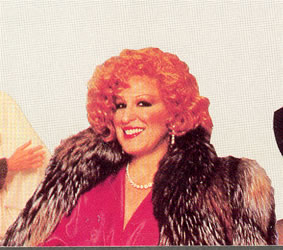 des Eaux, on which it is based. Nick Nolte is a vagrant pulled from a rich man's
swimming pool, predictably bedding the rich man's wife, mistress and daughter
in the course of the film. Nolte never suggests the irresistible sexual charisma
involved and, although Richard Dreyfuss is good as the cuckolded millionaire,
other star players barge unsubtly through director Paul Mazursky's witless script,
allowing a dog called Mike to steal the show.
des Eaux, on which it is based. Nick Nolte is a vagrant pulled from a rich man's
swimming pool, predictably bedding the rich man's wife, mistress and daughter
in the course of the film. Nolte never suggests the irresistible sexual charisma
involved and, although Richard Dreyfuss is good as the cuckolded millionaire,
other star players barge unsubtly through director Paul Mazursky's witless script,
allowing a dog called Mike to steal the show.